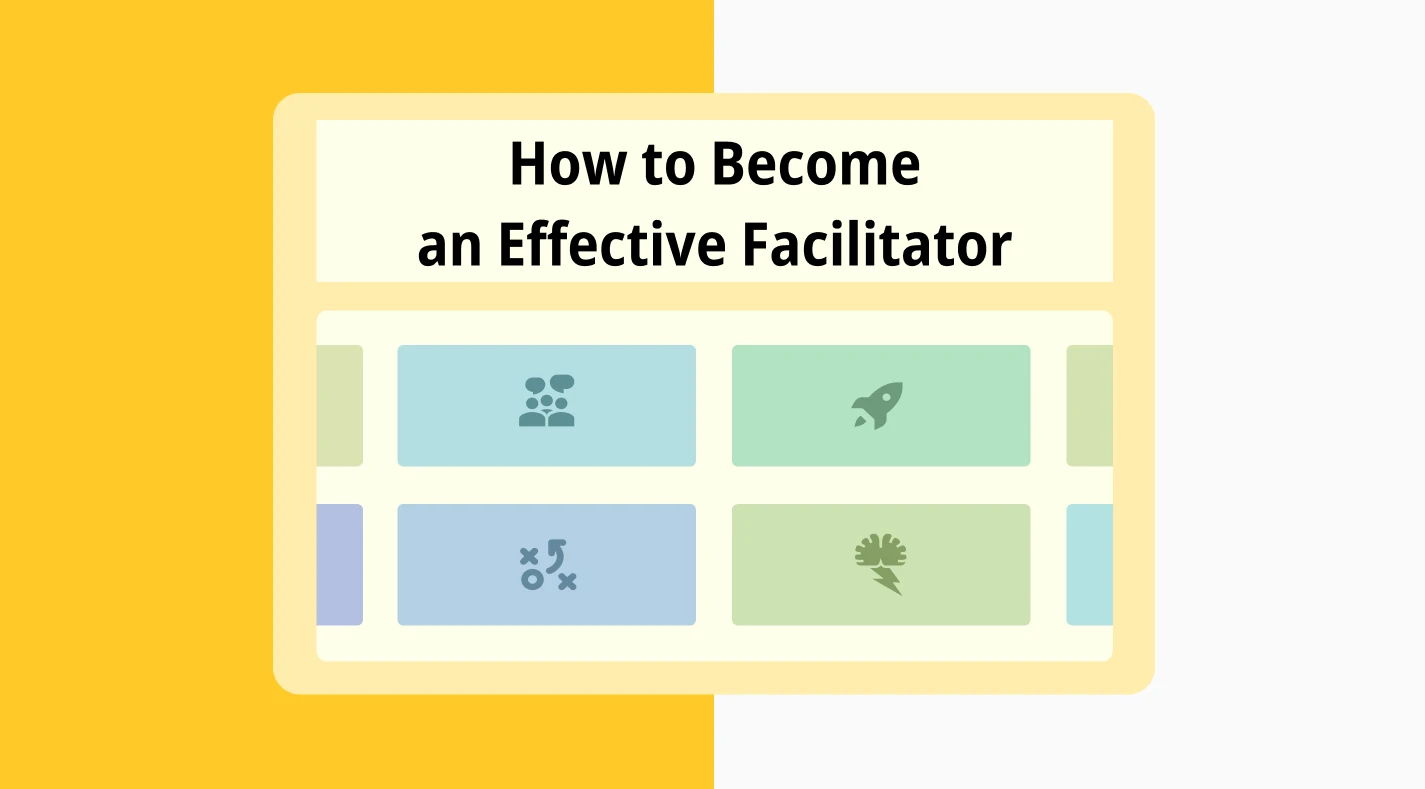
Effective facilitation is more critical than ever in today’s dynamic business environment. Facilitators help guide discussions, foster collaboration, and ensure that meetings/projects run smoothly. Their role is vital in driving productivity, innovation, and team cohesion. Businesses increasingly rely on diverse teams and remote work. The ability to facilitate effectively will have a significant impact on your project.
In this article, we will explore the key aspects of becoming an effective facilitator. This will include defining the role, essential qualities, and ideal contexts for facilitation. We will outline basic responsibilities, provide a how-to guide, and share business examples. Finally, we will discuss the advantages and expert tips and answer some FAQs.
By the end, you will definitely enhance your facilitation skills.
Let’s start with the definition: Who is a facilitator?

A facilitator is a person who helps a group of people understand their common objectives and assists them in planning how to achieve these objectives.
They play a neutral role and focus on the process rather than the content of discussions. Facilitators guide conversations and discussions, encourage participation, and ensure that everyone can express their opinions.
Who is an Effective Facilitator, & What are their Qualities?
An effective facilitator goes beyond guiding discussions. They possess a deep understanding of group dynamics and are skilled in conflict resolution. Effective facilitators are adaptable and they are able to maintain a neutral stance in heated debates. They use various techniques to engage participants.
They ensure that everyone feels valued and heard. 🫶
The qualities of an effective facilitator include strong communication skills, empathy, and the ability to remain neutral. They are excellent listeners, capable of understanding different perspectives and analyzing information quickly. Effective facilitators are also good at problem-solving and can handy unexpected situations.
They possess a high level of emotional intelligence. This allows them to navigate group dynamics smoothly. 🧠
Basic responsibilities of a facilitator
We are now familiar with the concept of facilitator. Let’s go deeper and understand more aspects of this subject by covering their basic responsibilities. If you want to become an effective facilitator, we recommend you to understand the following responsibilities:
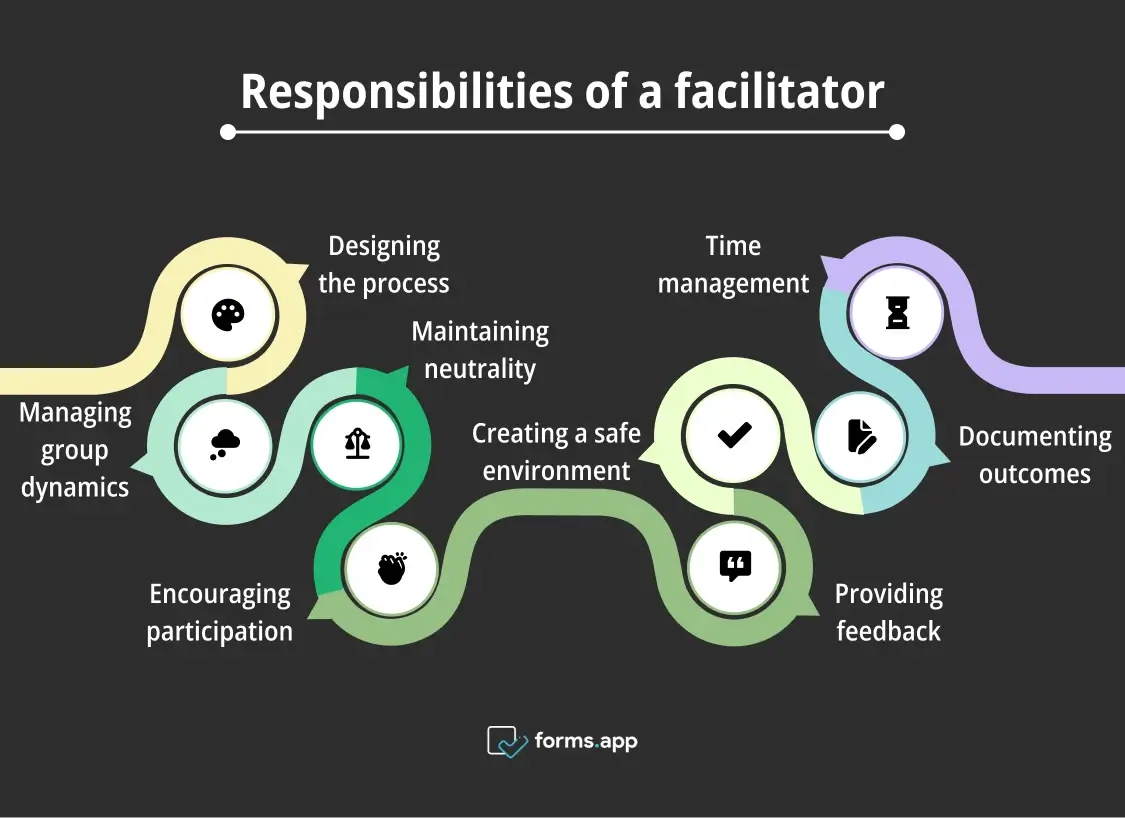
Responsibilities of a facilitator
🎨 Designing the process
One of the key responsibilities of a facilitator is designing the process for meetings or sessions. This involves planning the agenda, setting objectives, and determining the appropriate facilitation methods. A well-designed process ensures that the session runs smoothly, stays on track, and achieves its goals. Facilitators can create an environment fostering productive discussions and effective decision-making.
🤔💭 Managing group dynamics
Facilitators are responsible for managing group dynamics to ensure that all participants engage and contribute to the process. This involves monitoring interactions, addressing conflicts, and encouraging participation. By managing group dynamics effectively, facilitators can create a positive and inclusive environment where everyone feels valued. This leads to more meaningful and productive discussions and helps the group achieve its objectives.
⚖️ Maintaining neutrality
Another key responsibility of a facilitator is maintaining neutrality throughout the process. This means not taking sides or influencing the content of the discussion. When a facilitator stays neutral, they can create a safe space for participants to express their views and ideas. This fosters trust and openness.
👏🏼 Encouraging participation
Facilitators are also responsible for encouraging participation from all group members. This involves creating a welcoming environment, asking open-ended questions and ensuring that everyone has an opportunity to contribute. By encouraging participation, facilitators can improve the collective knowledge and creativity of the group. This leads to more innovative solutions and a stronger sense of ownership among participants.
⏳ Time management
Effective time management is a crucial responsibility of a facilitator. This involves keeping the session on track, managing the agenda, and ensuring that discussions do not last long. By managing time effectively, facilitators can ensure that they cover all topics and that the process achieves its objectives. Good time management also helps maintain participants’ focus and energy.
📝 Documenting outcomes
Facilitators should also document the outcomes of the process. This includes recording key points, decisions, and action items. By doing so, they provide a clear and accurate record of the process. This can later be useful for reference and follow-up. It also helps the teams ensure that they implement decisions and sustain their efforts properly.
✅ Creating a safe environment
Creating a safe and respectful environment is vital for any type of teamwork. The facilitator needs to establish the ground rules, address any disruptive behavior, and foster a culture of mutual respect. Excellent facilitators create a safe environment and ensure that the team members feel comfortable sharing their ideas and opinions. This, in turn, leads to more open and honest discussions.
🗣 Providing feedback
Facilitators need to provide feedback to their teams or individual participants. This involves highlighting strengths, identifying areas for improvement, and offering constructive suggestions. Experienced facilitators provide feedback and help participants develop their skills. This will enable more effective collaboration and desired outcomes in future processes.
How to become an effective facilitator
You have learned the basic responsibilities of an effective facilitator. Bear in mind that you will have those responsibilities if you take on this role. Now, let’s look at what skills you need to possess or what methods you should use how to become a professional facilitator.
💬Develop communication skills
To become an effective facilitator, you should develop strong communication skills. These skills include active listening, clear articulation, and the ability to read social cues. By enhancing these skills, you can engage team members, manage group dynamics, and ensure that discussions are productive. You should also be able to ask open-ended questions and summarize key points to ensure understanding.
👥Learn group dynamics
Understanding group dynamics will be very effective for you in the facilitation process. It involves recognizing different personality types, managing conflicts, and creating a collaborative environment. If you gain knowledge of the group dynamics, you can guess potential challenges and address them proactively. This helps you create a positive and inclusive atmosphere.
🧩Practice facilitation methods
Practicing facilitation methods is a key for you to become a skilled facilitator. This includes learning various methods for engaging participants, managing discussions and reaching consensus. When you practice these methods, you can develop the skills and confidence needed to facilitate effectively. This also involves role-playing scenarios, attending workshops, and seeking feedback from peers.
🔎Seek feedback and Reflect
Building on the facilitation methods, you should also seek feedback and reflect on your facilitation experiences. This is essential for your continuous improvement. It involves asking participants for their input on your facilitation styles, identifying areas for improvement, and implementing changes. Reflection allows you to learn from your experiences and understand what works well.
👁️Stay updated on best practices
Staying updated and proactive is important for you to maintain your effectiveness as a facilitator. You need to read articles, attend workshops, and join professional networks. If you stay informed about the latest methods and trends, you can continuously improve your facilitation skills. This helps you stay relevant and effective in guiding teams to achieve their goals.
4 Expert tips about being a good facilitator
To become a facilitator, it is essential to continuously refine your skills and approaches. Here, we will give you five expert tips to help you become a more effective facilitator. This will allow you to ensure better communication, collaboration, and successful outcomes in your meetings and discussions.
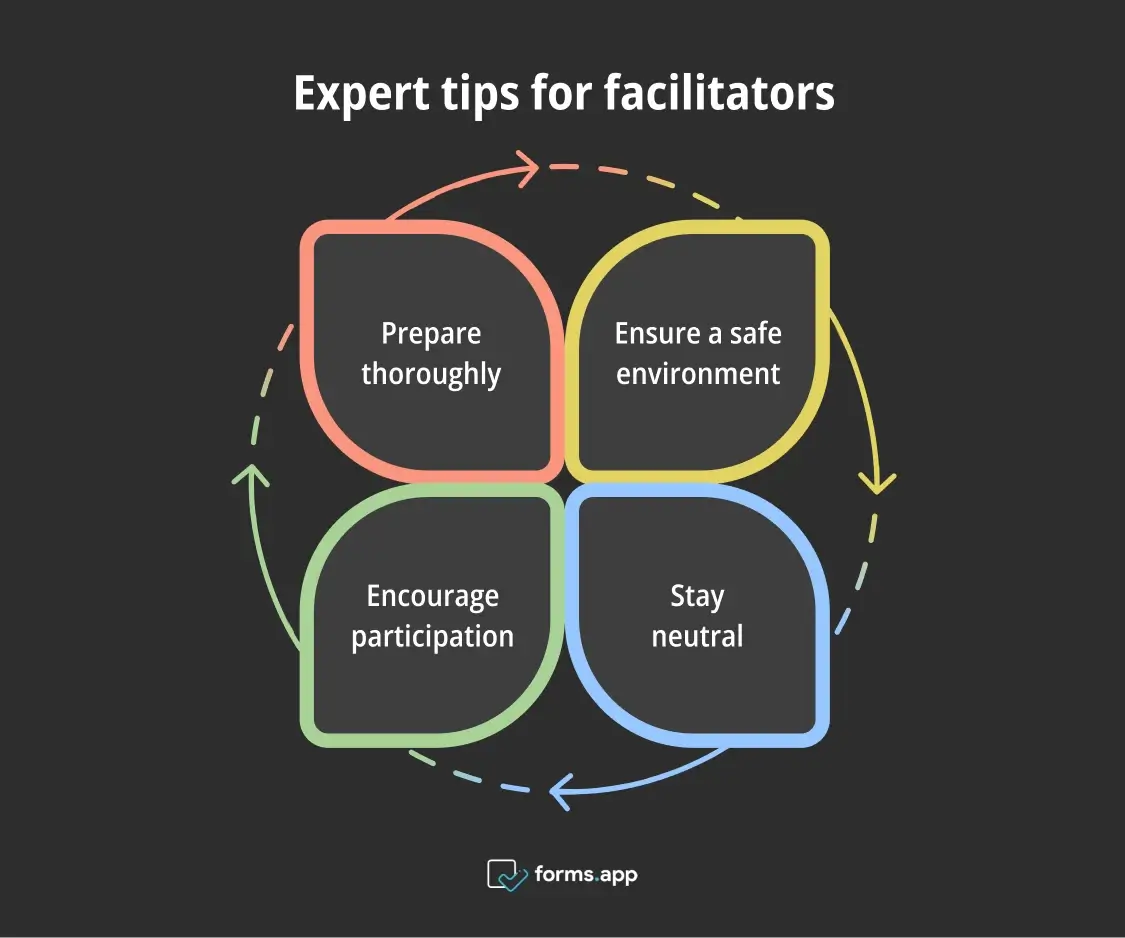
Pro tips about being a good facilitator
Tip 1: Prepare thoroughly
Do your homework. You will need to prepare thoroughly to make a good start. This means planning the agenda, setting clear objectives, and choosing the appropriate facilitation techniques. If you make a thorough preparation, you can ensure that the process runs smoothly and your team achieves its goals.
Anticipate potential challenges and develop strategies to address them.
Tip 2: Ensure a safe environment
Create a safe and respectful environment to ensure effective facilitation. This will involve establishing ground rules and addressing any disruptive behavior. You can create a safe environment. You will ensure that the team members/participants feel comfortable with sharing their opinions honestly.
Talk to people and give them a sense of safety both with your words and body language.
Tip 3: Encourage participation
You will need participation from other people to facilitate your work. The more participation you get, the more effective your facilitation will be. Create a welcoming environment, ask open-ended questions, and let everyone contribute. When you do this, you can also benefit from the collective knowledge and creativity of your team/group.
Tip 4: Stay neutral
You are not there to take sides. You are also not there to influence the content of the discussion. You need to remain neutral. It is a key to creating a safe and respectful environment. This will boost your team’s trust in you to resolve the ongoing process/dispute.
It will also foster openness.
When to use facilitation, in What contexts?
There are a variety of contexts and environments in which you can demonstrate your facilitation skills. Where there are people, there may be a need for facilitation. Now, armed with the knowledge above, let’s look at some of the contexts suitable for effective facilitation:
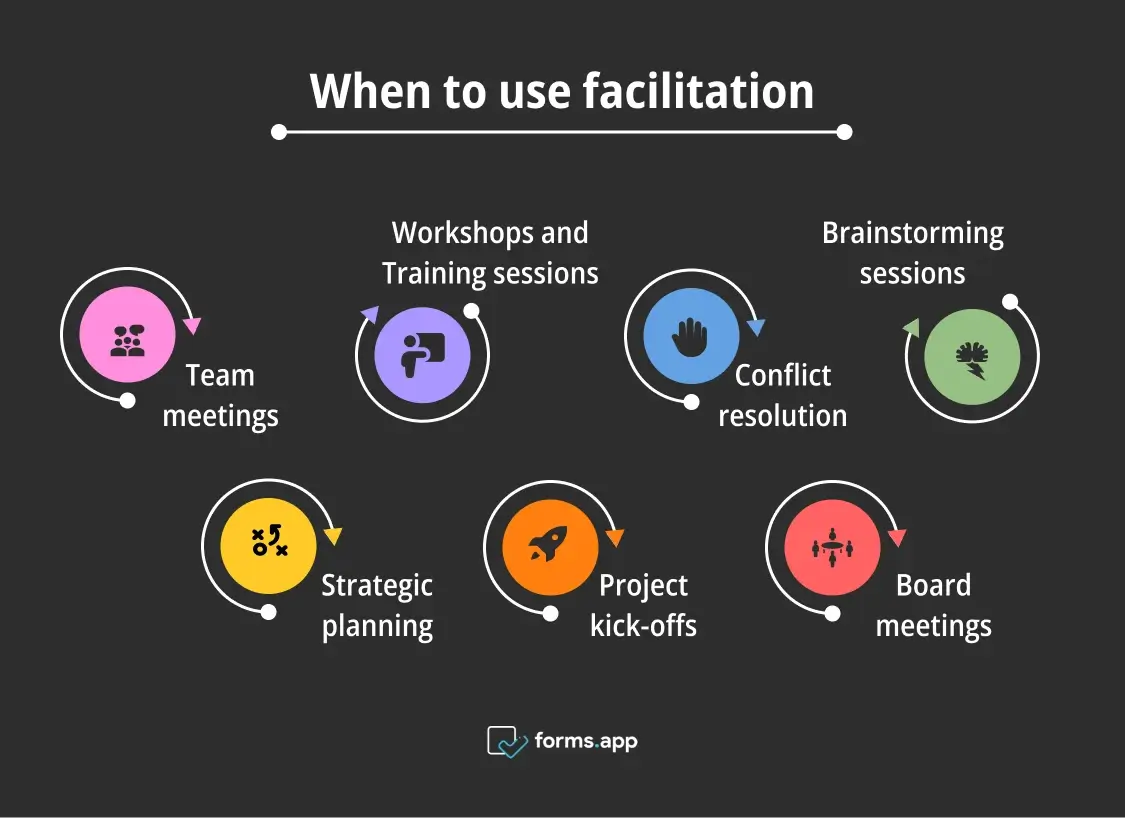
Right times to use facilitation
Team meetings
Team meetings are one of the most common environments where you may need to use your facilitation skills. It may not be a very complex project or a team that you are dealing with. However, you may need to guide the conversation and keep the balance. This will help your team make better decisions.
Workshops and Training sessions
Your facilitator skills may come in handy in workshops or training sessions. You can engage participants and enhance learning. You can design interactive activities, manage group dynamics, and keep the process focused. This way, you will ensure the contribution from participants.
Your team’s learning experience will become more impactful.
Conflict resolution
Your facilitation skills are invaluable in conflict resolution. You will need to mediate discussions and find common ground. As an effective facilitator, you should navigate the tensions, encourage open communication, and guide parties toward a mutually acceptable solution. When you are neutral and actively listening to people, you can foster an understanding and defuse the situation.
Brainstorming sessions
When people are thinking or developing ideas, conflict is sometimes inevitable. You may need to manage the flow of ideas and ensure that you hear all voices. Creating a safe space is vital for the participants to share their thoughts without fear of judgment/retaliation.
Strategic planning
When the planning is strategic, the disputes may also be strategic. As a facilitator, you may need to keep the focus on long-term goals. You should help identify priorities and manage group dynamics. Ensure you hear all stakeholders involved in the planning/decision-making process. This may help structure the decisions.
Project kick-offs
Effective facilitation may be critical in project kick-offs to set the tone and align the team on goals and expectations. You can guide the discussion, ensure everyone understands their roles, and address concerns. Use facilitation methods to foster collaboration and create a shared understanding of the project objectives.
Board meetings
Organizational silos can show themselves in board meetings. Different departments have different perspectives and opinions. You, as the facilitator, should understand everyone’s point of view in a neutral manner. Then, you should also guide the conversation. You need to ensure that all board members have the opportunity to contribute. This way, you’ll have a collaborative decision-making process.
Examples of Effective Facilitation
We have seen the suitable environments/contexts for your effective facilitation skills. However, we should confess that they are not very specific. Now, let’s look at some case examples/scenarios from well-known companies. We will get a clearer understanding of what effective facilitation is:
Example 1: Google
Google is known for its strong focus on effective facilitation within its teams. The company employs professional facilitators just for this purpose. These people guide the meeting process, brainstorming sessions, and strategic planning. The facilitators use several methods, such as engaging participants, managing group dynamics, and ensuring the discussions remain productive.
Google, therefore, fosters an inclusive and collaborative environment. Google’s facilitators help drive innovation and achieve the company's goals. Their approach to facilitation has been very important in terms of Google’s culture of creativity and continuous improvement.
Example 2: IDEO
IDEO is a global design and consulting firm. It places high value on effective facilitation. The company’s facilitators are skilled, especially in guiding creative processes, managing group dynamics, and fostering collaboration. They use various techniques, such as encouraging open communication and driving innovation.
IDEO creates a safe and inclusive environment for its employees. Its facilitators help teams generate innovative solutions and achieve their goals. Their facilitation practices have contributed to the company’s reputation for creativity and design excellence.
Example 3: Microsoft
Microsoft also uses effective facilitation to enhance collaboration and productivity between its teams. They train their facilitators to guide meetings and manage conflicts. They use facilitation techniques to create a structured and inclusive environment. The participants can share their ideas and contribute to decision-making.
By fostering open communication and collaboration, Microsoft helps drive innovation and achieve the company’s objectives. Their approach to facilitation has been key in maintaining Microsoft’s competitive edge. It has also fostered a culture of continuous improvement.
Advantages
Throughout the article, we briefly touched upon the benefits of effective facilitation. Now, let’s look at them in detail. You will be able to understand how you can benefit from effective facilitation. You will also see what it brings to the table in your daily business life:
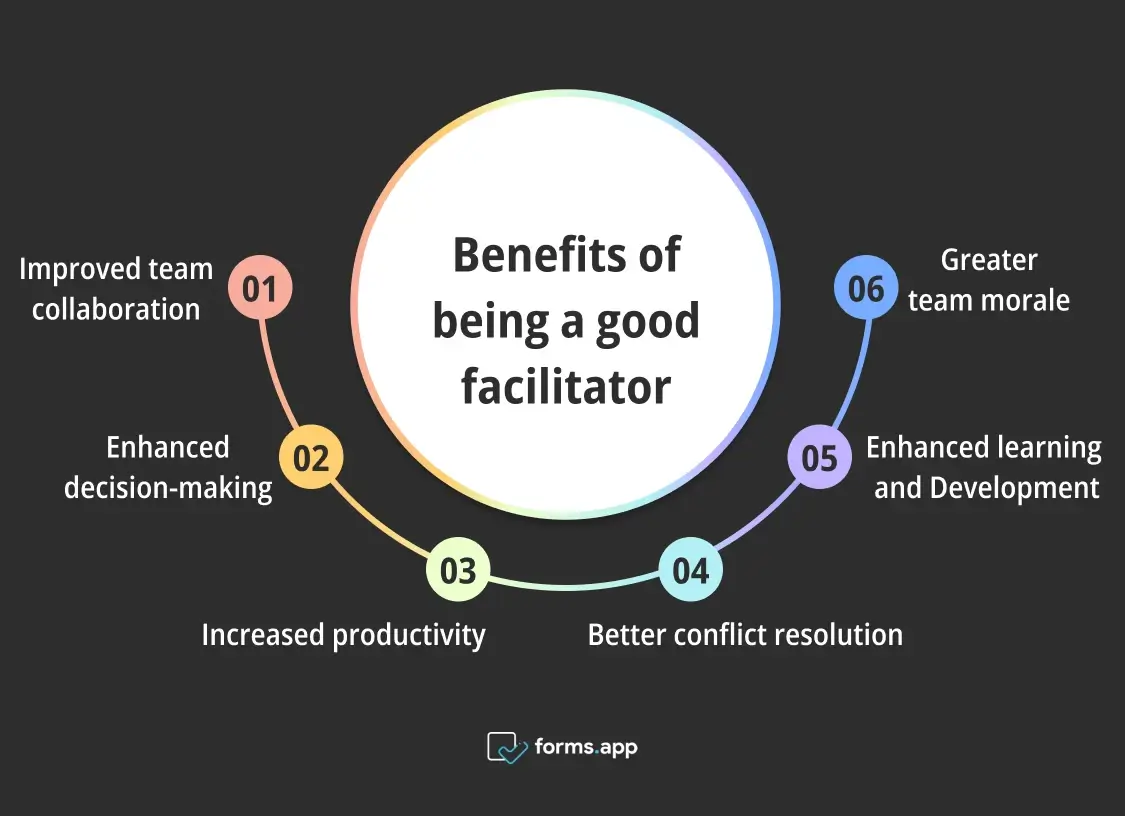
Advantages of being an effective facilitator
👍Improved team collaboration: Becoming an effective facilitator improves team collaboration. By guiding discussions and managing group dynamics, facilitators create an inclusive environment where all people feel valued and heard.
👍Enhanced decision-making: Effective facilitation leads to enhanced decision-making. Facilitators guide discussions, encourage participation, and help groups reach consensus. This ensures that teams consider all perspectives and make informed and balanced decisions.
👍Increased productivity: Becoming an effective facilitator increases productivity. Facilitators keep discussions on track, manage time limits, and ensure that meetings and sessions achieve their objectives. This minimizes wasted time and helps participants stay focused and engaged.
👍Better conflict resolution: Effective facilitators are skilled in managing conflicts and guiding groups toward resolution. By creating a safe and neutral environment, facilitators encourage open communication and help parties find common ground.
👍Enhanced learning and Development: Becoming an effective facilitator enhances learning and development. Facilitators create engaging and interactive sessions that encourage active participation and knowledge sharing. This leads to more meaningful learning experiences and helps participants develop new skills and insights.
👍Greater team morale: Effective facilitation contributes to greater team morale. Facilitators create an inclusive and supportive environment where all team members feel valued and heard. This fosters a sense of belonging and mutual respect, leading to higher levels of engagement and satisfaction.
Frequently Asked Questions on Effective Facilitation
Finally, let’s find answers to some of the most frequently asked questions about effective facilitation. Understanding these questions will help you better understand who is a facilitator and what is effective facilitation:
Les techniques de facilitation les plus courantes comprennent le remue-méninges pour générer des idées, la table ronde pour une participation égale, et la carte mentale pour une organisation visuelle. D'autres techniques incluent l'analyse SWOT pour la planification stratégique et les discussions en fishbowl pour des conversations approfondies. De plus, les facilitateurs utilisent l'écoute active, la synthèse et les questions pour guider les discussions, encourager l'engagement et s'assurer que toutes les voix sont entendues et prises en compte.
Les principales qualités d'un facilitateur efficace comprennent de solides compétences en communication, de l'empathie et la capacité à rester impartial. Ils sont d'excellents auditeurs, capables de comprendre différentes perspectives et de synthétiser rapidement l'information. Les facilitateurs efficaces sont également doués pour résoudre les problèmes et peuvent gérer les situations imprévues avec facilité. Ces qualités permettent aux facilitateurs de gérer efficacement les interactions de groupe et d'atteindre des résultats productifs.
La neutralité est importante en facilitation car elle garantit que tous les participants se sentent en sécurité pour exprimer leurs points de vue et leurs idées. En restant neutre, les facilitateurs créent un environnement équilibré où les discussions sont justes et inclusives. Cela favorise la confiance et l'ouverture, permettant au groupe d'explorer différentes perspectives et de parvenir à un consensus. Maintenir la neutralité est essentiel pour atteindre des résultats productifs et impartiaux.
Key points to take away
In conclusion, becoming an effective facilitator involves developing strong communication skills, understanding group dynamics, and practicing facilitation techniques. Facilitators play a vital role in guiding discussions, fostering collaboration, and ensuring that meetings and projects run smoothly. By remaining neutral, encouraging participation, and creating a safe environment, facilitators can enhance team collaboration, decision-making, and productivity.
In this article, we have discussed what makes an effective facilitator and outlined the contexts for your facilitation skills. We have also covered basic responsibilities, provided a guide on how to become one, and shared some real-life examples. Finally we have explored the advantages and answered some frequently asked questions. Use this guide to become a better facilitator!
Fatih is a content writer at forms.app and a translator specializing in many text domains, including medical, legal, and technical. He loves studying foreign languages. Fatih especially likes to create content about program management, organizational models, and planning tools.
Table des Matières
- Let’s start with the definition: Who is a facilitator?
- Who is an Effective Facilitator, & What are their Qualities?
- Basic responsibilities of a facilitator
- How to become an effective facilitator
- 4 Expert tips about being a good facilitator
- When to use facilitation, in What contexts?
- Examples of Effective Facilitation
- Advantages
- Frequently Asked Questions on Effective Facilitation
- Key points to take away



 12 minutes de lecture
12 minutes de lecture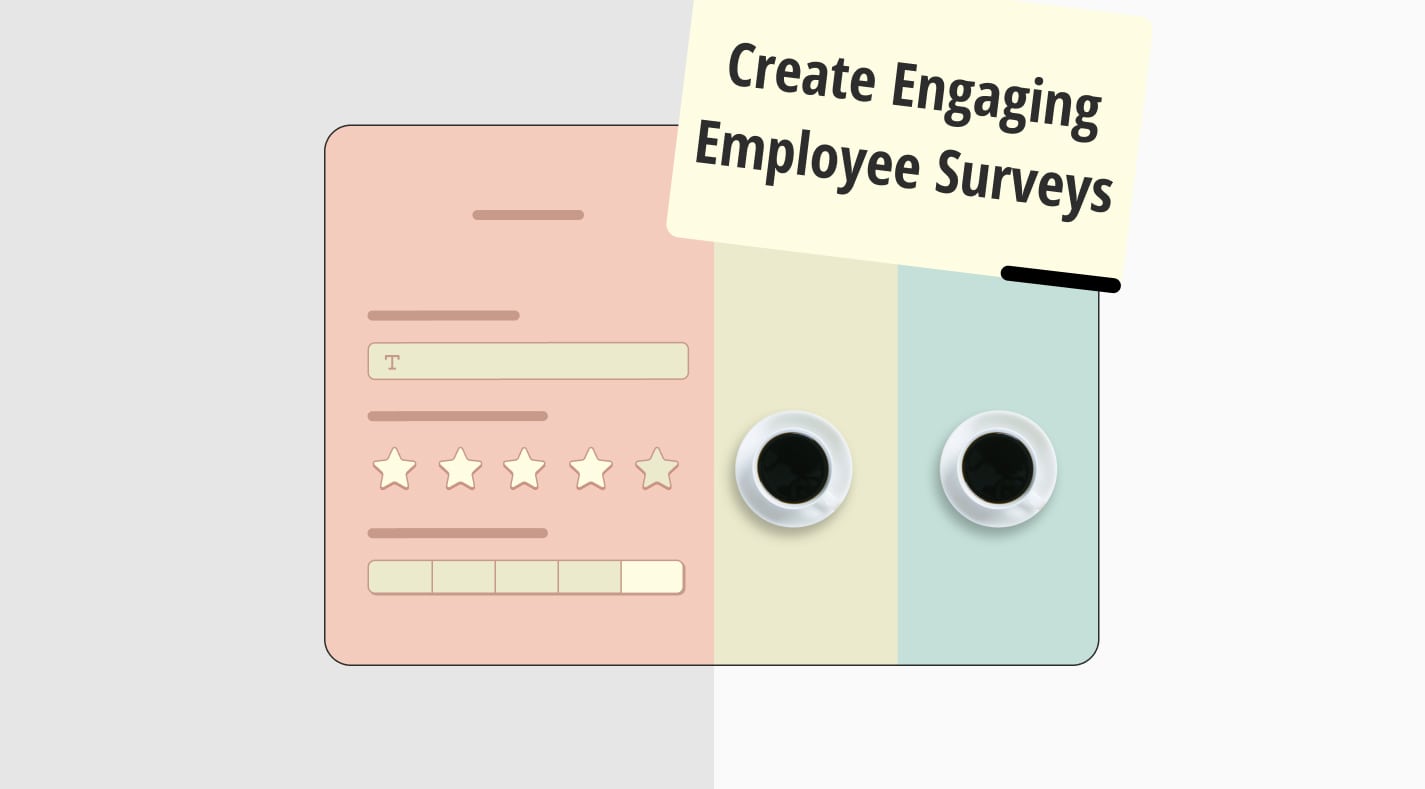
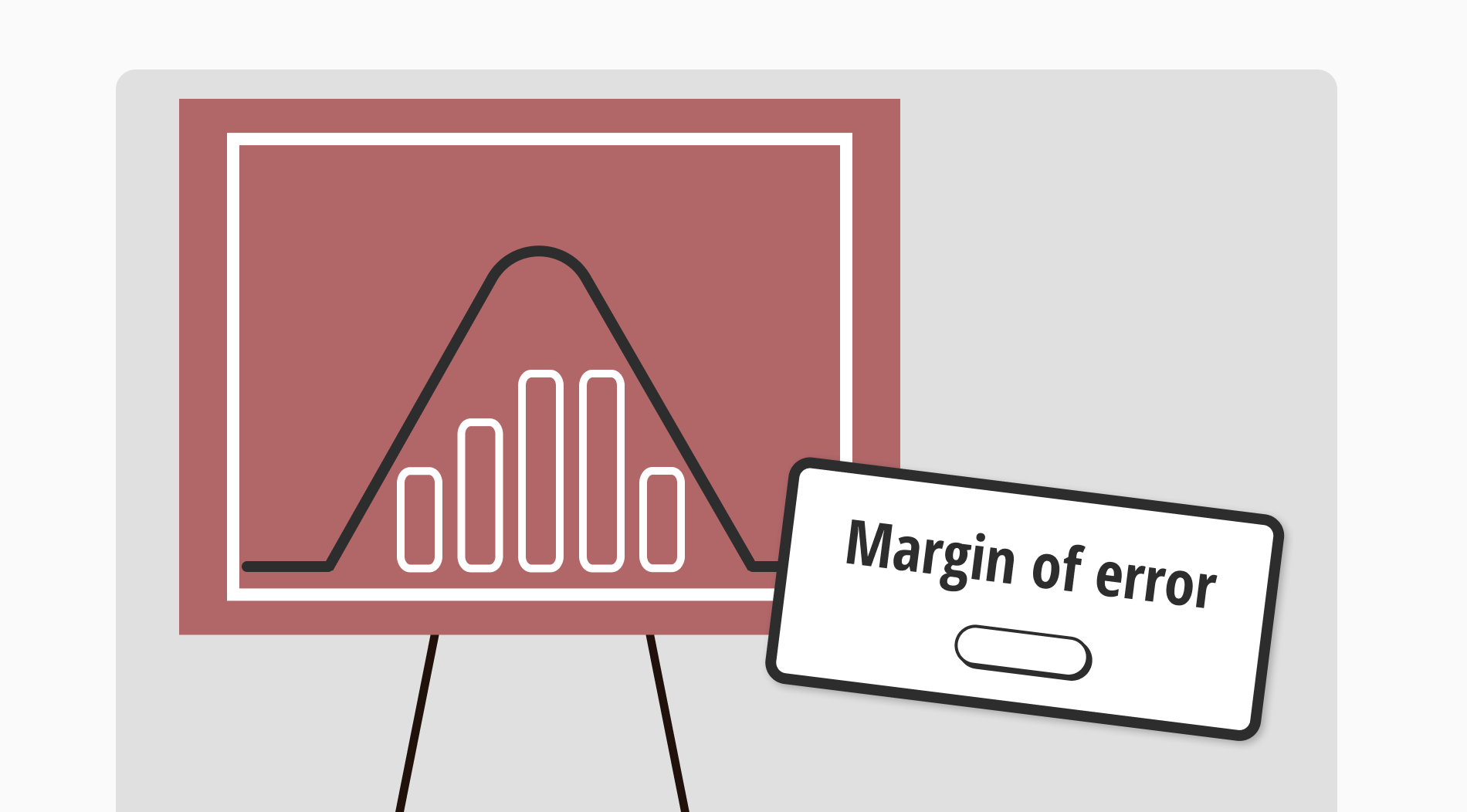
.png)